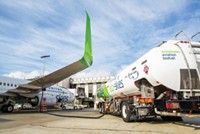Advertisement
Grab your lab coat. Let's get started
Welcome!
Welcome!
Create an account below to get 6 C&EN articles per month, receive newsletters and more - all free.
It seems this is your first time logging in online. Please enter the following information to continue.
As an ACS member you automatically get access to this site. All we need is few more details to create your reading experience.
Not you? Sign in with a different account.
Not you? Sign in with a different account.
ERROR 1
ERROR 1
ERROR 2
ERROR 2
ERROR 2
ERROR 2
ERROR 2
Password and Confirm password must match.
If you have an ACS member number, please enter it here so we can link this account to your membership. (optional)
ERROR 2
ACS values your privacy. By submitting your information, you are gaining access to C&EN and subscribing to our weekly newsletter. We use the information you provide to make your reading experience better, and we will never sell your data to third party members.
Biofuels
California refiners shift production to renewable diesel
New entrants will compete with chemical industry for cheap feedstocks
by Melody M. Bomgardner
August 19, 2020
| A version of this story appeared in
Volume 98, Issue 32

Phillips66, Global Clean Energy, and Marathon Oil all plan to convert their California petroleum refineries to producing renewable diesel from plant oils and animal fats.
Prices for petroleum-derived fuels have been squashed by the economic impact of the novel coronavirus. In contrast, producers of renewable fuels expect to profit, thanks to significant subsidies for climate-friendly transportation fuels.
The renewables shift could create stiff competition for limited stocks of cheap oils and fats, according to the energy consultancy Stratas Advisors. Any price increases would also impact the soap and detergent industry, which relies on animal fats as raw materials for products such as cationic surfactants. The American Cleaning Institute, a trade group, has pressed for biofuel mandates to exclude animal fats as a feedstock option but has not been successful.
Phillips66 plans to use fats and greases, along with used cooking oil and soybean oil, at its San Francisco Refinery in Rodeo. The firm says it will produce 19 million barrels (bbl) per year of renewable diesel, gasoline, and aviation fuel starting in 2024.
A refinery conversion in Bakersfield will use a new feedstock: Camelina sativa, an oilseed crop grown in rotation with wheat. Global Clean Energy bought the facility in May. It plans to make renewable diesel starting in 2022 and has a deal to sell 2.5 million bbl per year of the fuel to ExxonMobil.
Finally, Marathon says it may convert its idled refinery in Martinez to renewable diesel, though it has not given an estimate of the plant’s expected capacity or when it will come on-line. This year it will finish converting a facility in Dickerson, North Dakota, to take in soybean and corn oil.
The three new entrants will join established players Neste, Valero, and REG in supplying renewable diesel to California.
Renewable diesel is considered identical to petroleum-derived diesel but has roughly half the lifecycle greenhouse gas impact. It is made by catalytically converting plant or animal triglycerides into propane and longer alkanes, a process that removes oxygen from the inputs. It is a different fuel than biodiesel, which is made by reacting vegetable oil with methanol to produce methyl esters. Commercial diesel fuels cannot contain more than 20% biodiesel.
Under California’s Low Carbon Fuel Standard, fuel companies are required to purchase enough certified low carbon fuel to reduce the carbon intensity of the state’s pool of transportation fuel 20% from 2011 to 2030.
Fuel companies that fall under the target must purchase credits from renewable fuel makers to make up the difference. The credits, currently worth about $200 per metric ton of renewable fuel, and additional credits from the federal Renewable Fuel Standard, ensure profits for producers.




Join the conversation
Contact the reporter
Submit a Letter to the Editor for publication
Engage with us on Twitter